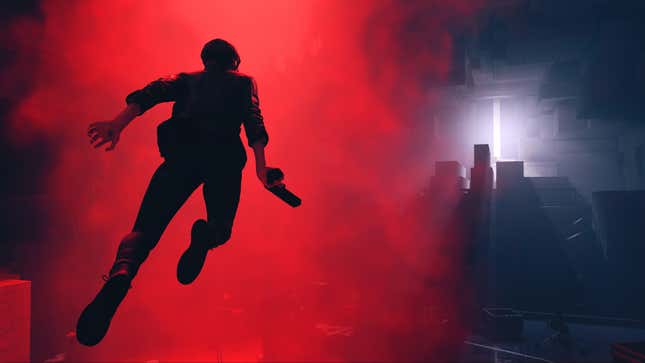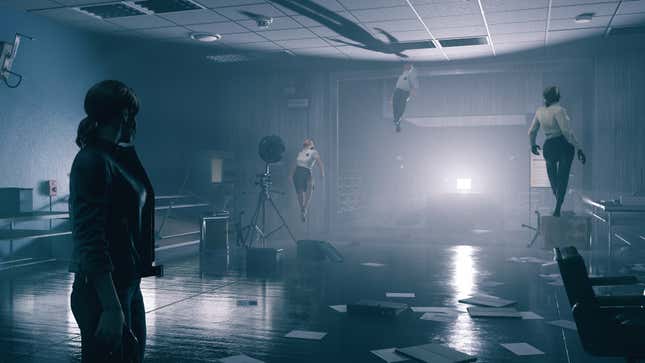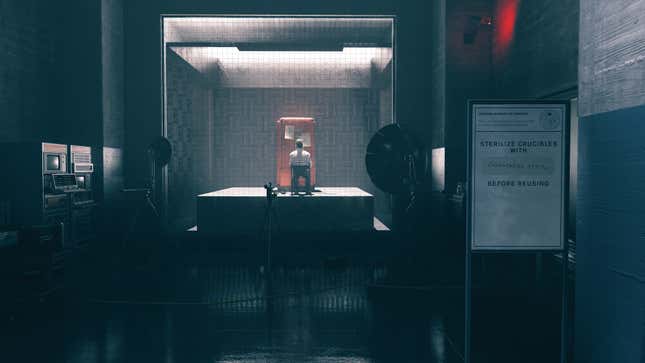
Control’s setting, a secretive government facility that studies supernatural happenings, is engrossing. If you can’t get enough of the game’s surreal atmosphere, perhaps you should check out the SCP Foundation, a community-run fiction archive that many speculated was an inspiration for Control. It turns out that speculation was correct. Kotaku spoke with the SCP Foundation and Control’s director about the overlap between their expansive science fiction worlds.
The ways in which Control is influenced by the SCP Foundation are clear. Like the SCP Foundation, the Federal Bureau of Control is dedicated to finding supernatural phenomena. Both have a strong focus on bureaucracy. The majority of the SCP Foundation is made up of the remnants of a bureaucratic system that’s obsessed with research and procedures. Control is set in a government agency responding to pressure from above to find a practical application for each and every thing they study. The SCP Foundation has its own extensive fictional history on its website, but the reality of its creation is a bit more mundane. According to their own account, the entire endeavor began in 2007 when the very first entry, SCP-173, was posted to the 4chan board /x/, which is dedicated to the supernatural.
“The initial appearance of SCP-173 was something really different to the /x/ community,” reads the SCP Foundation’s “History of the Universe.” Instead of being a basic story with a jump-scare punchline, or a thing that made you feel squicked and scared, it was designed to make you wonder, and draw fear from that. You can imagine the reaction of many internet dwellers as they first scrolled down to see that thread.”
SCP-173 is a creature that must be observed 24/7, lest it escape its cell. Like all SCP entries to follow, it wasn’t structured as a story, but instead as a document that details the creature and the procedures to contain it. The scariness of SCP-173 comes more from the implication that it might get out than anything else. How long can you watch something before you inevitably look away?
From there, the SCP Foundation has evolved into a fiction-writing community with over 5,000 user-submitted entries. My personal favorite is SCP-1733, a video tape of a basketball game where the players and audience become aware that they’re trapped in a tape as it is played over and over. It doesn’t end well. The SCP Foundation’s community outreach organizer, C. Pierce, also known as by his username ProcyonLotor, thinks the staying power of the community has to do with the lack of spaces online to workshop original fiction.
“I think it’s something largely unique,” Pierce said. “Of course there are other writing websites on the internet, and there are other bigger, more prominent ones, but fanfiction.net or Archive of Our Own are obviously aiming at a different audience. You don’t really see the bare-knuckle critique focus.”

To Pierce, Control’s most obvious homage is the documentation lying around in-game. “I think the most direct influence are the case files,” he said. In Control, you can pick up documents during gameplay that flesh out the fiction of the world. Some of these are case files for supernatural objects that outline their history and how to contain them. Structurally they’re formatted like an entry in the SCP Foundation Wiki.
“You’ve seen an SCP document, with the containment procedures up top and then the description, and a photo in the top right?” Pierce continued. “You look at the case files in the game, you have a photo in the top right, and then the containment procedure, in those words.”
Mikael Kasurinen, the director of Control, confirmed that the similarities weren’t just coincidence. He said that the SCP Foundation was one influence among many and that the game strives to be a pastiche of many different sources rather than a homage to one specific source. Within Control, there’s DNA from the X-Files, Twin Peaks, and even a little Buffy The Vampire Slayer in its snappy dialogue. To call it a rip-off of the SCP Foundation would be myopic. The way that Remedy has blended together so many different sources has turned those materials into their own stew. The fiction of Control doesn’t slot neatly into the worlds of any of its influences. While the SCP Foundation and Control may share a common ancestor, they’re distant cousins rather than twins.
“The Federal Bureau of Control is obviously subservient to the U.S. Government. Throughout the fiction, the Foundation’s degree of control and global influence varies from author to author,” Pierce said. “The Federal Bureau of Control, obviously there’s a research aspect, but it seems a lot less research-focused than the Foundation. For the Foundation, research and containment are the two equal goals. But for the Federal Bureau of Control, obviously control is the first thing.”
The drive to classify the unclassifiable is what connects SCP and Control, ultimately. To Kasurinen, that drive is just a basic part of being a human.
“It’s an interesting question of how to accumulate knowledge of what is true,” Kasurinen continued. “The name of the game is not an accident in the sense that it’s not just about control in the physical sense. I can control the environment, and I can control the minds of my enemies, but it’s also about the philosophical idea of being in control.” As Kasurinen points out, the beginning of the game has main character Jesse Faden at an utter disadvantage in terms of her knowledge and also her power. Through learning more about the Bureau, she not only takes control of it as Director but is also able to take control of her unresolved past.

Pierce said that he doesn’t feel ripped off by Control whatsoever and in fact feels like Remedy did their homework on how closely they could reference these outside sources without getting into legal trouble. Pierce handles licensing for the SCP Foundation as well as community outreach, so he should know. But even if Control is ultimately its own thing, to Pierce, it’s also the best SCP Foundation game ever made. The SCP Foundation has had other games based on their material, like SCP Containment Breach, made famous by the likes of YouTubers like Markiplier. But while SCP Containment Breach may make explicit references to the fiction of the SCP Foundation, Control captures the tone that kept people like Pierce coming back to the community.
“I just had this warm fuzzy feeling throughout the game, seeing the cultural influence of something I’ve spent eight years of my life kind of doing as a hobby,” Pierce said. “I think in fairness, they clearly had the inspiration [from us], but they took it in their own direction. They did something with it that we could not do in a thousand years.”